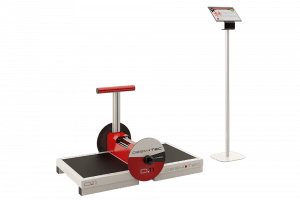Scientific study for Physiotherapists
It was presented at the “XXII International Congress of Sport Rehabilitation and Traumatology”, in Milan Italy.
The study was published by Sebastiano Zuppardo, Physiotherapist, knee specialist and Desmotec Academy member.
The aim of this project was to assess the eccentric strenght deficit during the last rehabilitation phase after ACL reconstruction and the recovery of such deficit after resuming agonistic sport activity. The device DESMOTEC D.SPORT was used during the research process.
Desmotec D.SPORT
ABSTRACT
This study tries to assess the eccentric strength deficit during the last rehabilitation phase after ACL recnstruction and the recovery of such deficit after resuming agonistic sport activity. As a matter of fact, many studies have lately focused their attention on the recovery of the eccentric strength by means of rehabilitation protocols with earlt high intensity resistance exercises stimulating the eccentric phase.
Click here to read the whole feature.
DESMOTIPS SCIENTIFIC EVIDENCE:
- G. Annibalini, Muscle and Systemic Molecular Responses to a Single Flywheel Based Iso-Inertial Training Session in Resistance-Trained Men, Università Carlo Bo di Urbino
- M. Beato, EPost-activation potentiation effect of eccentric overload and traditional weightlifting exercise on jumping and sprinting performance in male athletes, University of Suffolk
- M.Beato, Effects of postactivation potentiation after an eccentric overload bout on countermovement jump and lower-limb muscle strength, University of Suffolk.
- G. Coratella, Effects of in-season enhanced negative work-based vs traditional weight training on change of direction and hamstrings-to-quadriceps ratio in soccer players, Università degli Studi di Milano.
- D.Susta, Isoinertial exercise does not cause clinically significant muscle damage: A pilot study, Dublin City University
